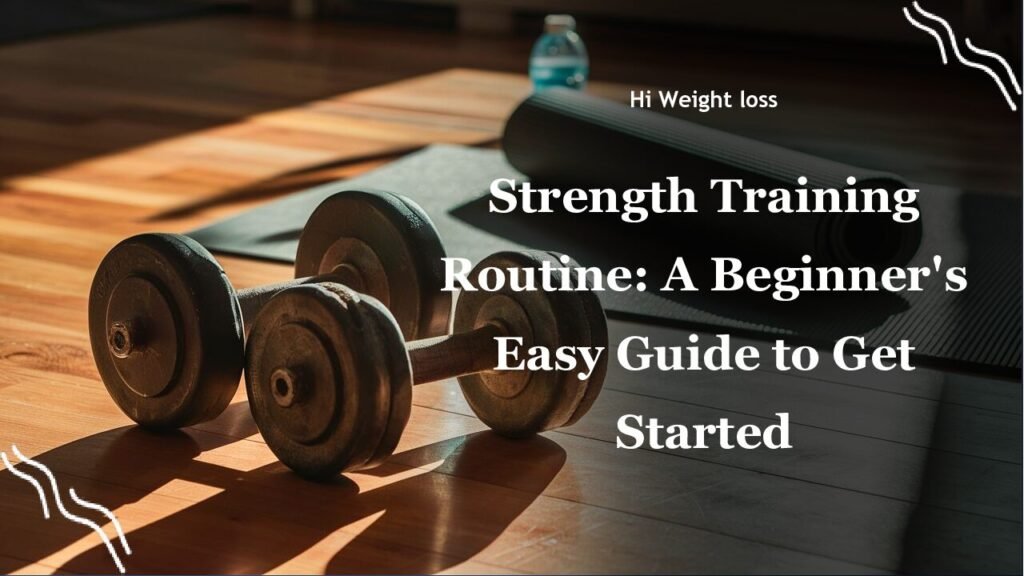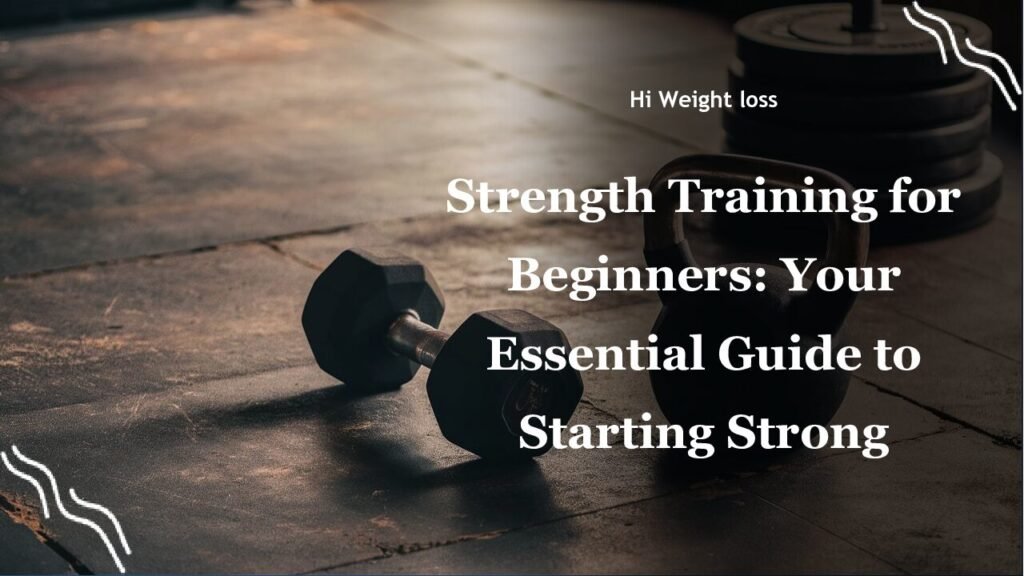“`
Are you wondering what would happen if you only lifted weights and skipped cardio? Many people are, and the answer isn’t as simple as “yes” or “no.” Imagine committing fully to strength training, feeling the burn, seeing the muscles grow, but ignoring the treadmill. What does this mean for your overall fitness and especially your weight loss goals? In this article, we’ll explore the effects of focusing solely on weightlifting, looking at both the benefits and drawbacks, and guiding you through whether it’s right for *you*.
What Happens If You Only Lift Weights and No Cardio?
The Power of Weightlifting: Building Muscle and Strength
Let’s start with the good news: weightlifting is incredibly effective for building muscle and increasing strength. Resistance training causes tiny tears in your muscle fibers. These tears trigger a repair process, resulting in muscle growth through a mechanism called muscular hypertrophy. This is backed by research, as seen in this YouTube video that explains how weightlifting stimulates muscle development.
I remember when I first started lifting. I was so focused on pushing heavier weights that I didn’t think about the other aspects of fitness. Within months, I saw significant changes in my physique and how much I could lift. My biceps were more defined, and I felt generally stronger and more capable. This was all achieved through consistent weightlifting.
Boosting Your Metabolism with Weightlifting
Weightlifting isn’t just about bigger muscles; it also gives your metabolism a boost. By increasing your muscle mass, you raise your Basal Metabolic Rate (BMR). This is the rate at which your body burns calories while at rest. So, even when you’re not actively working out, your body is burning more calories than if you didn’t lift weights. In fact, OneLife Fitness explains how weightlifting enhances your resting metabolic rate.
A friend of mine, Sarah, experienced this first-hand. She started a weightlifting routine and, even though she hadn’t changed her diet drastically, she noticed she was losing weight more easily. Her increased muscle mass was burning calories more efficiently.
Can You Lose Weight By Only Lifting Weights?
Now, for the question everyone wants to know: can you lose weight by only lifting weights and no cardio? The answer is yes, but with a caveat. Weightlifting, while not directly burning as many calories as cardio during the workout itself, indirectly contributes to fat loss. As you lift, you deplete your glycogen stores. This forces your body to turn to fat for energy. Fitbod’s blog provides more detail on how this process works.
However, it’s crucial to understand the importance of a calorie deficit. Fat loss occurs when you consistently burn more calories than you consume. You can achieve this deficit through diet alone, and weightlifting is a tool that can help you burn more fat indirectly while building muscle at the same time. The core principle is that energy balance matters the most. I have seen this principle in action so many times. If you are in calorie deficit and weight train, you will lose fat.

The Importance of a Calorie Deficit for Weight Loss
It’s important to understand that no amount of exercise will counteract a calorie surplus. This means that if you consistently eat more calories than your body needs, you will still gain weight, regardless of how much you weight train. Therefore, while weight training will help you lose weight, you also need to pay attention to your diet.
This is where it’s essential to consider a holistic approach to weight loss. Weightlifting plays a critical part, but it’s just one piece of the puzzle. The main factor is to eat fewer calories than you use per day, this is how you get to lose weight.
Potential Drawbacks of Skipping Cardio
While weightlifting alone has many benefits, there are some potential drawbacks to consider, especially if you’re entirely skipping cardio. Cardio exercises, like running or cycling, significantly improve cardiovascular health and endurance. These benefits aren’t always fully replicated by weightlifting alone. The OnePeloton blog explains how cardio and weightlifting can complement each other.
My uncle, a former marathon runner, always emphasized the importance of a well-rounded fitness routine. He used to say that while lifting weights made him feel strong, it was the cardio that gave him the energy and stamina for the long haul. If you are interested in all-round fitness, you should consider implementing cardio.
Impact of Weightlifting on Body Composition
Focusing on only weightlifting, your body composition may change substantially. Your muscles will develop and grow, but it’s important to note that your weight might not drop as drastically as someone who combines cardio and weightlifting. This is because muscle is denser than fat, so as you gain muscle, you might see the scale stay the same, even if you are losing fat and seeing yourself getting leaner.
The key takeaway is to focus on the overall look and feel of your body, not just the number on the scale. You might end up losing fat, building muscle, and looking great even if your weight hasn’t moved, which is a very good thing!
Benefits of Lifting Weights without Cardio: A Summary
Let’s recap the benefits of weightlifting without cardio. You will build muscle and strength and increase your basal metabolic rate. Weightlifting will also lead to fat loss, especially if you are in a calorie deficit. You will also improve your overall body composition, with more muscle and less fat.
Weightlifting helps your body to burn fat by depleting glycogen stores, forcing your body to use fat for fuel. This is all backed up by the authoritative resources that have been linked throughout this article. I have personally experienced the benefits of weight training without cardio, and based on these experiences, I know it can be very effective.
Table of Comparison: Weightlifting Only vs. Combined Approach
| Benefit | Weightlifting Only | Weightlifting and Cardio |
|---|---|---|
| Muscle Growth & Strength | High | High |
| Metabolic Rate Increase | Moderate to High | Moderate to High |
| Fat Loss | Yes, with calorie deficit | Yes, more readily |
| Cardiovascular Health | Low | High |
| Endurance | Low | High |
Conclusion
So, what happens if you only lift weights and skip cardio? You’ll build muscle, boost your metabolism, and lose fat if you’re in a calorie deficit. You might even have a complete body composition transformation. However, you might miss out on the significant cardiovascular and endurance benefits that cardio offers. In the end, it all depends on your specific fitness goals and what’s important to you. Consider the different approaches, and take some time to think about what you want to achieve, and then make a decision based on what’s best for you. Remember Sarah’s experience with weightlifting and my uncle’s emphasis on a well-rounded approach? Use them to inspire you. Now it’s up to you to choose what works for you.
If you found this article helpful, please share it with someone who might be wondering the same thing. Also, consider starting a well balanced fitness regime that incorporates both weight training and cardio. Start today, not tomorrow. Your health is a very important thing, and you deserve it!
FAQ
Can you lose fat just by lifting weights?
Yes, you can lose fat through weightlifting, especially if you’re in a calorie deficit. Weightlifting depletes your glycogen stores, forcing your body to burn fat for energy.
Is it bad to only lift weights and not do cardio?
While not inherently bad, skipping cardio means you might miss out on significant cardiovascular and endurance benefits. It’s important to consider a well-rounded fitness approach if possible.
How often should I lift weights to lose weight?
Aim for at least 2-3 sessions per week, focusing on compound movements that work multiple muscle groups. Remember, consistency is key.
Will weight training alone help me burn calories throughout the day?
Yes, weight training can increase your Basal Metabolic Rate (BMR), which helps you burn more calories at rest throughout the day.
Does lifting weights increase metabolism?
Absolutely. Weightlifting increases your muscle mass, which in turn raises your BMR, leading to an increased metabolism.
“`



